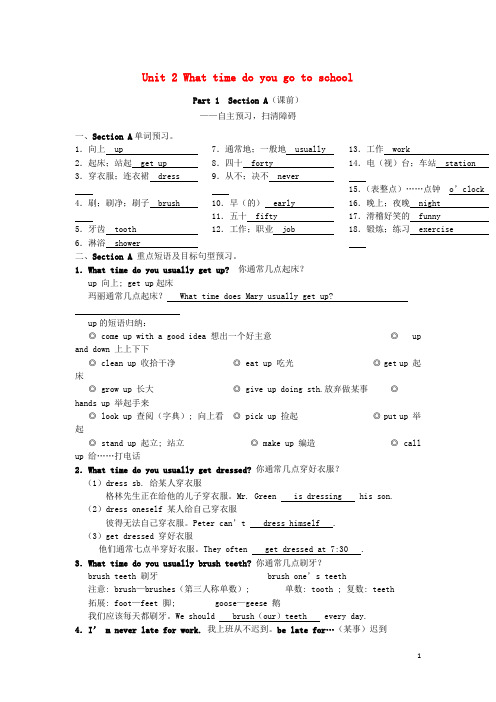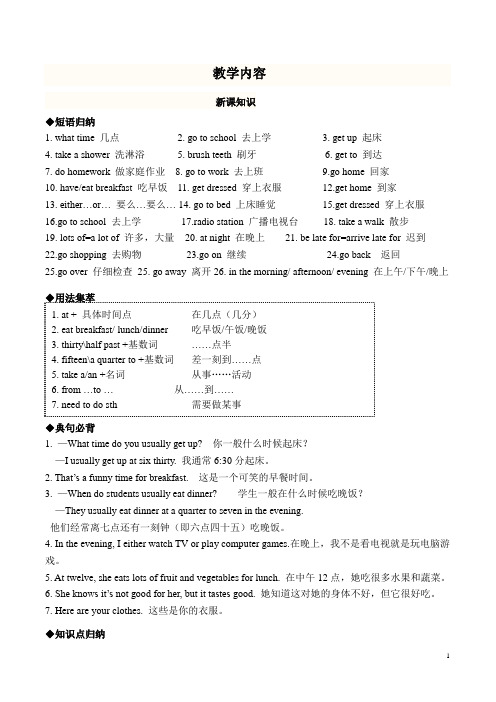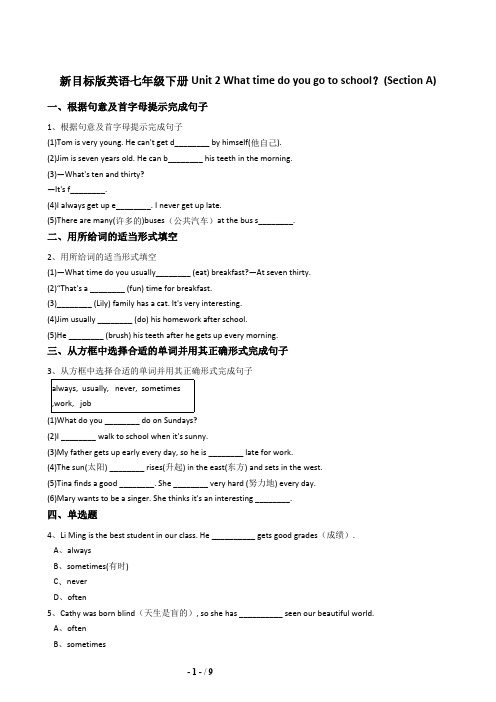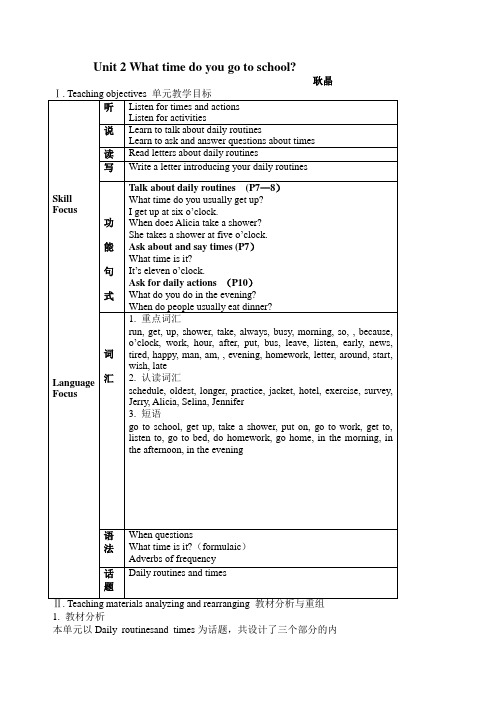新目标七年级下Unit 2 What time do you usually go to school
人教新目标版 七年级英语下册 Unit 2 课前+课后同步练习习题 单元合集(含答案)

Unit 2 What time do you go to schoolPart 1 Section A(课前)——自主预习,扫清障碍一、Section A单词预习。
1.向上 up2.起床;站起 get up 3.穿衣服;连衣裙 dress4.刷;刷净;刷子 brush5.牙齿 tooth6.淋浴 shower 7.通常地;一般地 usually8.四十 forty9.从不;决不 never10.早(的) early11.五十 fifty12.工作;职业 job13.工作 work14.电(视)台;车站 station15.(表整点)……点钟o’clock16.晚上;夜晚 night17.滑稽好笑的 funny18.锻炼;练习 exercise二、Section A重点短语及目标句型预习。
1.What time do you usually get up? 你通常几点起床?up 向上; get up起床玛丽通常几点起床? What time does Mary usually get up?up的短语归纳:◎ come up with a good idea 想出一个好主意◎ up and down 上上下下◎ clean up 收拾干净◎ eat up 吃光◎ get up 起床◎ grow up 长大◎ give up doing sth.放弃做某事◎ hands up 举起手来◎ look up 查阅(字典); 向上看◎ pick up 捡起◎ put up 举起◎ stand up 起立; 站立◎ make up 编造◎ call up 给……打电话2.What time do you usually get dressed?你通常几点穿好衣服?(1)dress sb. 给某人穿衣服格林先生正在给他的儿子穿衣服。
Mr. Green is dressing his son.(2)dress oneself 某人给自己穿衣服彼得无法自己穿衣服。
人教新目标英语七年级下册Unit2--3单词句型讲解词汇课件

词汇点睛
lot pron. 大量;许多
lots of = a lot of 大量的;许多的 +n
a lot (adv.) 修饰动词或句子 很;比较
【联想与总结】
many 许多的 +可数名词复数形式 much大量的 +不可数名词 some一些 +可数名词复数形式/不可数名词
Period 2
get up v. 起床
词汇点睛
【原文】What time do you usually get up?
【拓展】get 得到;拿;取;理解----getting(动名词) get up 起床 get to到达 get home到家 get on上车 get off 下车 get dressed穿衣
词汇点睛
brush v. 刷; n.刷子
tooth n.牙----teeth(pl.)
【例句】I brush my teeth after getting up. 【拓展】brush---brushes(动词三单形式;名词复数形式)
brush one’s teeth There are two brushes under the chair. Mary gets up at 7:00 and brushes her teeth at 7:15.
Period 1
o’clock n …点钟
词汇点睛
【例句】Most of students get up at seven o’clock these days.
【拓展】
时间---几点几分的表达用词及用法1
整点---(1)整时数(钟点数)+o’clock (单数)
七年级英语下册_Unit2_what_time_do_you_go_to_school知识点__练习和答案

教学内容新课知识◆短语归纳1. what time 几点2. go to school 去上学3. get up 起床4. take a shower 洗淋浴5. brush teeth 刷牙6. get to 到达7. do homework 做家庭作业8. go to work 去上班9.go home 回家10. have/eat breakfast 吃早饭11. get dressed 穿上衣服12.get home 到家13. either…or… 要么…要么… 14. go to bed 上床睡觉15.get dressed 穿上衣服16.go to school 去上学17.radio station 广播电视台18. take a walk 散步19. lots of=a lot of 许多,大量20. at night 在晚上21. be late for=arrive late for 迟到22.go shopping 去购物23.go on 继续24.go back 返回25.go over 仔细检查25. go away 离开26. in the morning/ afternoon/ evening 在上午/下午/晚上◆用法集萃1. at + 具体时间点在几点(几分)2. eat breakfast/ lunch/dinner 吃早饭/午饭/晚饭3. thirty\half past +基数词……点半4. fifteen\a quarter to +基数词差一刻到……点5. take a/an +名词从事……活动6. from …to … 从……到……7. need to do sth 需要做某事◆典句必背1. —What time do you usually get up? 你一般什么时候起床?—I usually get up at six thirty. 我通常6:30分起床。
七年级下册Unit2Whattimedoyouusuallygetup复习要点

Unit 2 What time do you go to school?重点单词,向上,穿衣服连衣裙,刷,牙齿,淋浴淋浴器,通常的,冲动,早,50,工作,电台车站,夜晚,滑稽可笑的,练习锻炼,最好的,一半半数,晚于,家庭作业,群,生活生命,跑,有时,大量的,打扫,行走,很快的,有 ------味道?短语归纳1. what time 几点2. go to school 去上学3. get up 起床4. take a shower 洗淋浴5. brush teeth 刷牙6. get to 到达7. do homework 做家庭作业8. go to work 去上班9. go home 回家10. eat breakfast 吃早饭11. get dressed 穿上衣服12. get home 到家13. either ⋯ or要⋯么⋯要么⋯14. go to bed 上床睡觉15. in the morning/ afternoon/ evening 在上午 / 下午 / 晚上16. take a walk 散步17. lots of=a lot of 许多,大量18. radio station 广播电台19. at night 在晚上20. be late for=arrive late for迟到◆用法1. at +具体时间点在几点(几分)2. eat breakfast/ lunch/dinner吃早饭 /午饭/晚饭3. thirty\half past +基数词⋯⋯点半4. fifteen\a quarter to + 基数词差一刻到⋯⋯点5. take a/an + 名词从事⋯⋯活动6. from⋯ to ⋯从⋯⋯到⋯⋯7. need to do sth需要做某事重点句子1.你通常几点洗澡?我通常6:40 洗澡2. SCOTT有一个有趣的工作. 他在电台工作3.他每天从下午 3 点工作到 6 点4.那真是一个滑稽的早饭时间5.我通常早上六点钟锻炼,6.我上班从来不迟到。
2017人教新目标版英语七下Unit 2《What time do you go to s

4. ________________
How long Sandy watches TV
5. ________________
写 前 指 导
一、根据文章内容,完成下列信息卡。
Half past six
For an hour
Five
In the concert hall
Having dinner
写 前 指 导
二、重点词汇积累。6. 每天 _________________________ 7. 快速洗个澡 ____________________8. 上学迟到 _____________________ 9. 弹钢琴 _______________________10. 回家 ________________________ 11. 在晚上 ______________________12. 做作业 ______________________13. 忙碌的一天 ___________________
思 路 点 拨
(省略)
__________________________________________________________________________ _____________________________________
写 前 指 导
home. In the evening, first she has dinner at six twenty, and then she does her homework at half past seven. From nine o’clock to nine thirty, Sandy either reads books or watches TV for an hour, then she goes to bed. What a busy day she has!
新目标版英语七年级下册 Unit2Whattimedoyo Ugotoschool?同步练习及答案

17、补全对话 Interviewer: Deng Li has an interesting job. She works in a school in Hubei. Deng Li is one of the most beautiful countryside teachers(最美乡村教师之一) in 2015.(1)________ Deng Li: From six o'clock every morning to five in the afternoon. Interviewer:(2)________ Deng Li: At five. Interviewer:(3)________ Deng Li: A little. But I am happy. Interviewer:(4)________ Deng Li: Yes, I am. I am always good with them. Interviewer:(5)________ Deng Li: Yes, I like it very much.
四、单选题
4、Li Ming is the best student in our class. He __________ gets good grades(成绩). A、always B、sometimes(有时) C、never D、often
5、Cathy was born blind(天生是盲的), so she has __________ seen our beautiful world. A、often B、sometimes
________ ________ you ________ a shower in the morning? (5)I usually learn English at eight on the radio.(用 he 代替 I 改写句子) He ________ ________ English at eight on the radio.
七年级新目标下Unit_2_What_time_do_you_go_to_school教案

Unit 2 What time do you go to school?耿晶1. 教材分析本单元以Daily routinesand times为话题,共设计了三个部分的内容。
旨在通过单元教学使学生学会谈论日常行为、询问并答复有关时间的问题、询问并回答人们在特定时间所从事的活动。
Section A 学习谈论日常作息时间。
1a, 1b, 1c 重点学习和学生息息相关的几种日常行为的英文表示方法,学会询问和答复日常作息时间。
2a, 2b, 2c ,2d继续学习谈论自己或他人的日常作息时间。
重点学习如何询问,这也是本单元的语法重点。
3a, 3b, 3c 学会叙述他人的日常活动安排,同时学习询问时间和时间表达法,进一步巩固询问别人的日常作息时间的表达法。
Section B 继续学习询问和谈论别人的日常行为。
1a, 1b, 2a, 1c,1d,1e,学会谈论和询问一天内各个时间段的活动安排。
2a,2b,3a,3b学会通过两个人的对比介绍来判断并养成好的作息时间。
Self check 重点单词句型复习2. 课型设计与课时分配Period 1 Listening and speaking (I)(Section A: 1a, 1b, 1c)Period 2 Listening and speaking (II)(Section A:2a, 2b, 2c,2d)Period 3 Integrating skills(Section A:3a, 3b, 3cSection B: 1a, 1b,1c,1d,1e)Period 4 Reading and writing(Section B:2a, 2b, 2c,3a,3b)Period 5 Self checkⅢ. Teaching plans for each periodPeriod 1 Listening and speaking(Ⅰ) Target language目标语言1. Words && phrases生词和短语Up,get up,dress,get dressed,brush,tooth,shower,take a shower,usually,forty, what time,2. Key sentences重点句子When do people usually ...? People usually ...What time do you usually ...? I usually ...Ability goals能力目标Enable students to learn to talk about daily routines.Learning ability goals学能目标Help the students learn how to talk about daily routines.Teaching important / difficult points教学重难点How to talk about daily routines.Teaching aids教具准备A tape recorder and a model clock.Teaching procedures and ways教学过程与方式Step ⅠWarming upIn this procedure, motivate students to learn some words and phrases by singing the songs they’ve learned before.T: Good morning, everyone. (sing) “Good morning to you. Good morning to you. Good morning, dear children. Good morning to you.” This song is easy to learn. Who can sing it to us?Encourage students to sing the song.T: Well done. Thank you! We sing “Good morning to you” in the morning. Then what do we sing in the afternoon and in the evening? S: We sing Good afternoon to you in the afternoon and Good evening to you in the evening.T: That’s right. I know all of you are very good at singing. Does anyone want to sing Good afternoon to you or Good evening to you to us?Step ⅡTalking and reading (1a)In this procedure, ask students to finish the required task and learn some key phrases about daily actions.T: As we all know, time is very important and in English there is a famous saying "An hour in the morning is worth two in the evening." So what do you do in the morning?S1: I read English. S2: I do morning exercise.T: And what do you do in the afternoon and in the evening?S1: I play basketball in the afternoon. S2: I watch TV in the evening.T: I’m very glad to hear that. You use your time very well. And there’re many daily things we can do. Now let’s read these phrases in 1a and match these actions and the time of day.Step ⅢPracticeIn this procedure, students will learn how to talk about actions and the time of day.T: I know you’re very clever. Now I want you to tell if my statements are right or wrong. First, I usually eat dinner in the morning. S: Wrong.T: When do I usually eat dinner? S: In the evening.T: Second, she gets up at 19:00 in the morning. S: Wrong.T: What is the correct way of saying the sentence? S: She gets up at 7:00 in the morning.T: How clever you are! Now let’s read the conversation in groups and see which group reads better.Ask students to do pairwork.T: Please ask your partner when people usually do these things: do homework, eat dinner, eat breakfast and go to bed.(Write “When do people usually ...”on the blackboard)Sample dialogue:S1: When do people usually do homework?S2: People usually do homework in the afternoon.Interest the students in going on practicing the conversation using a new way of reading.T: Now let’s try a new way of reading. First I name one student to ask a question, and then ask all of you repeat this question together. After that, I name another student to answer this question, and all of you repeat the answer together.Sample dialogue:S1: When do people usually go to bed?S: When do people usually go to bed?S2: People usually go to bed in the evening.S: People usually go to bed in the evening.Step ⅣTalking about time (1c)In this procedure, students will learn how to ask about and say hour times and learn some key phrases about daily routines.T: Boys and girls, please listen to what I’m saying and guess what it is. 小小骏马不停蹄,日日夜夜不休息,蹄声哒哒似战鼓,提醒人们争朝夕。
人教新目标七年级英语下册课堂笔记Unit 2 What time do you go to

Unit 2 What time do you go to school?2012版人教新目标七年级英语下册课堂笔记1. upadv. 向上n 反义词:down nget up起床nstand up起立Please lift your head up.2. dress v. 穿衣服n. 连衣裙n复数:dressesn get dressed穿上衣服My daughter is too young to dress herself.3. brush v. 刷;刷净n. 刷子n 复数:brushes n 单三: brushes nwipe擦nsweep扫nrub摩擦nscrape刮掉You have to brush your shoes now.4. toothn. 牙齿n 复:teeth nbrush teeth刷牙ntoothpick牙签ntoothpaste牙膏ntoothbrush牙刷The baby has two teeth.常见的可数名词单数变复数时不规则变化的名词有: man, woman, child, foot, mouse, tooth 等。
我们可以用这样一句话来记忆这些单词“男女孩子的脚踩住老鼠的牙”5. shower n. & v. 淋浴,(名)淋浴器n 近: bath 洗澡,沐浴ntake/have a shower洗澡nshower下阵雨,倾注;阵雨,大量倾泻nshow给……看You’d better take a shower.6. usually adv. 通常地,一般地Do you usually go to the park?n unusually异乎寻常地7. fortynum. 四十n 表示“几十”的数字都以-ty结尾。
n词形特殊的有:twenty, thirty, forty, fifty, eighty.nfour四nfourteen十四There are 40 students in Class One.8. never adv. 从不; 绝不n Better late than never.迟做总比不做好。
- 1、下载文档前请自行甄别文档内容的完整性,平台不提供额外的编辑、内容补充、找答案等附加服务。
- 2、"仅部分预览"的文档,不可在线预览部分如存在完整性等问题,可反馈申请退款(可完整预览的文档不适用该条件!)。
- 3、如文档侵犯您的权益,请联系客服反馈,我们会尽快为您处理(人工客服工作时间:9:00-18:30)。
Unit 2 What time do you usually go to school?
一、词汇拓展
1. up(反义词)down
2. brush(单三)brushes
3. tooth(复数)teeth
4. always(反义词)never
5.early(反义词)late
6. work(同义词)job
7. night(反义词)day 8. half(复数)halves 9. run(现在分词)running ; runner (跑步者)
10. clean(现在分词)cleaning 11. either…or… (反义词)neither …nor…
12. life(复数)lives 13. taste(单三)tastes 14 job (可数) work(不可数)
15 good—better ---best 16 well ---better ---best 17 quick ---slow 18 quickly----slowly
19 sometimes = at times(有时) sometime (某个时候) some time (一些时间)some times (几次)
二、重点短语与句型
1.get up 起床,站起dress sb 给某人穿衣服Sb. get dressed某人穿上衣服
2.have/take a shower 洗淋浴brush teeth涮牙have/ eat breakfast 吃早餐What time 几点,何时go to school 去学校get to school 到达学校do (one's) homework 做作业
3. at night 在晚上all day 整个晚上in the day 在白天from…to…从……到…… in the morning/afternoon/ evening 在上午/下午/晚上go to work 去上班go to school 去上学
That's a funny time for…那是做……有意思的时间。
be late for…做……迟到
4. on weekends=on the weekend 在周末on school days 在上学期间
5. take a walk 散步,走一走 a quarter past seven = 7:15 a quarter to seven = 6:45
half past +钟点数……点半half past five= 5:30
go to bed 上床睡觉go home 回家get home 到家
6. either…or要么……要么,或者…..或者lots of=a lot of =many+可数(复数)大量,许多…lots of=a lot of =much+不可数大量,许多….
eat quickly 吃得快eat a quick dinner = eat dinner quickly 快速吃晚餐
eat a good breakfast早餐吃得好,好好吃一顿早餐eat…for lunch午餐吃……
after lunch /dinner 午餐/晚餐后play sports=do sports=exercise 做运动
have much time for sth=have much time to do sth 有许多时间做……
for half an hour 半小时play basketball for half an hour 打半小时的篮球
be not good for =be bad for 对……健康没有益be good for 对……健康有益
taste good 尝起来好吃have a very healthy life 有健康的生活
need to do …需要做…… after doing to have …为了有…… 做……后
from Monday to Friday从周一到周五at a radio station在广播电台make breakfast for sb.替某人做早饭
三、关键句型
1. What time do you usually get up? I usually get up at six thirty.
2. That’s a funny time for breakfast.
3. When do students usually eat dinner?
They usually eat dinner at a quarter to seven in the evening.
4. In the evening, I either watch TV or play computer games.
5. At twelve, she eats lots of fruit and vegetables for lunch..
6. She knows it’s not good for her, but it tastes good.
7. Here are your clothes.。
